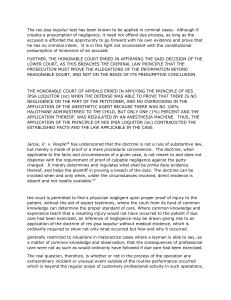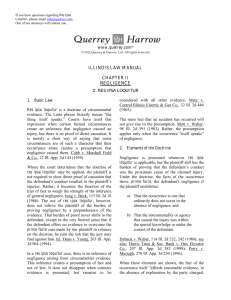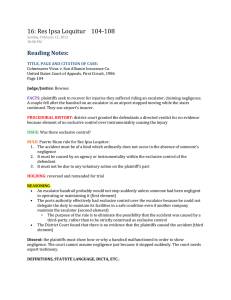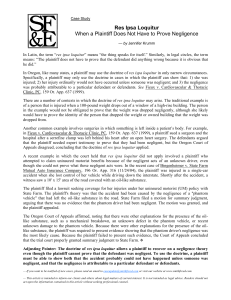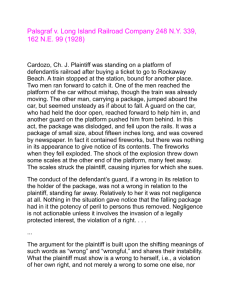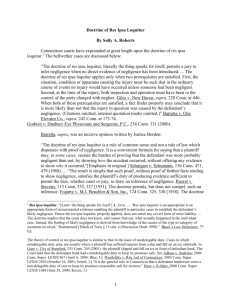File
advertisement
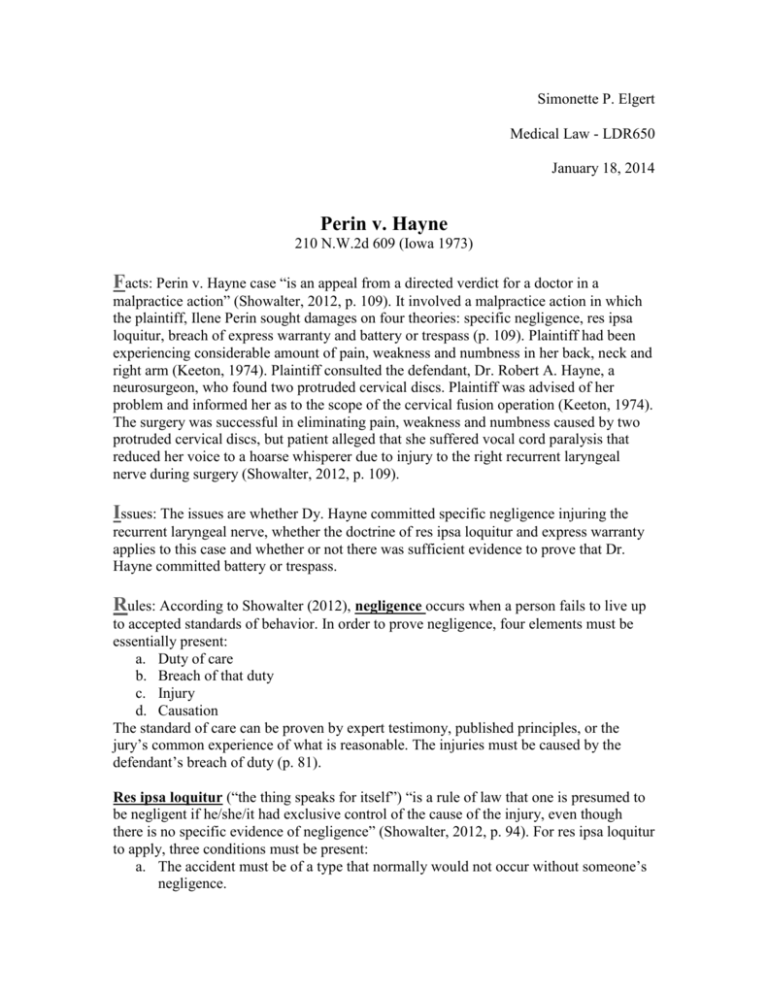
Simonette P. Elgert Medical Law - LDR650 January 18, 2014 Perin v. Hayne 210 N.W.2d 609 (Iowa 1973) Facts: Perin v. Hayne case “is an appeal from a directed verdict for a doctor in a malpractice action” (Showalter, 2012, p. 109). It involved a malpractice action in which the plaintiff, Ilene Perin sought damages on four theories: specific negligence, res ipsa loquitur, breach of express warranty and battery or trespass (p. 109). Plaintiff had been experiencing considerable amount of pain, weakness and numbness in her back, neck and right arm (Keeton, 1974). Plaintiff consulted the defendant, Dr. Robert A. Hayne, a neurosurgeon, who found two protruded cervical discs. Plaintiff was advised of her problem and informed her as to the scope of the cervical fusion operation (Keeton, 1974). The surgery was successful in eliminating pain, weakness and numbness caused by two protruded cervical discs, but patient alleged that she suffered vocal cord paralysis that reduced her voice to a hoarse whisperer due to injury to the right recurrent laryngeal nerve during surgery (Showalter, 2012, p. 109). Issues: The issues are whether Dy. Hayne committed specific negligence injuring the recurrent laryngeal nerve, whether the doctrine of res ipsa loquitur and express warranty applies to this case and whether or not there was sufficient evidence to prove that Dr. Hayne committed battery or trespass. Rules: According to Showalter (2012), negligence occurs when a person fails to live up to accepted standards of behavior. In order to prove negligence, four elements must be essentially present: a. Duty of care b. Breach of that duty c. Injury d. Causation The standard of care can be proven by expert testimony, published principles, or the jury’s common experience of what is reasonable. The injuries must be caused by the defendant’s breach of duty (p. 81). Res ipsa loquitur (“the thing speaks for itself”) “is a rule of law that one is presumed to be negligent if he/she/it had exclusive control of the cause of the injury, even though there is no specific evidence of negligence” (Showalter, 2012, p. 94). For res ipsa loquitur to apply, three conditions must be present: a. The accident must be of a type that normally would not occur without someone’s negligence. b. The defendant must have had sole control of the apparent cause of the accident. c. The plaintiff could not have contributed to the accident (p. 94). Express warranty is an assurance or guarantee of some kind, given explicitly either in words or writing (www.law-dictionary.clearpointlaw.com). Battery is the actual touching without legal authority or permission (Showalter, 2012, p. 68). Along with assault, it is grouped in three categories: a. Those in which no consent for the touching was obtained at all. b. Those in which the physician exceeded the scope of the consent given. c. Those in which the consent was “uninformed” (p. 68). Analysis: Plaintiff alleged that there was sufficient evidence to support her claim that the defendant negligently cut or injured the laryngeal nerve causing paralysis of the vocal cord, thus damaging her voice (p. 109). The record did not show any evidence the nerve was severed during surgery. The doctors also agree that the technique used by the defendant was proper. An injury may occur despite due care, a finding of negligence cannot be predicated solely on the fact it did occur (p. 110). The record only supports an inference that plaintiff suffered an extremely rare injury due to the anterior approach cervical fusion surgery, which may occur even when due care is exercised. There is no basis for res ipsa loquitur and for saying that the plaintiff’s injury is the result of negligence on the part of the defendant (p. 111). The claim for express warranty was dismissed. The evidence did not support the plaintiff’s argument that the defendant guaranteed her a “good result” (p. 111). Plaintiff also brought forward evidence to submit the case on the theory of battery and trespass based on her allegation that she only consented to the fusion of two vertebrae but four vertebrae were fused. Although the plaintiff was not advised of the possibility of the hazard of vocal cord paralysis, she was fully made aware of the nature of her problem and the extent of corrective surgery (p. 112). The evidence is undisputed that whether one or two fusions were done, the same procedure of retracting the visceral column would have to be done, hence the retraction procedure was not battery or trespass (p. 112). Conclusion: Upon examination of each of the plaintiff’s theories, the Supreme Court of Iowa concluded that the trial court’s determination finding the evidence insufficient to support jury consideration of the case on any of the pleaded theories, had been correct and affirmed. References Express warranty. (n.d.). In Clearpoint Law.com Retrieved January 17, 2014, from http://law-dictionary.clearpointlaw.com/e/express-warranty_Sta.aspx Keeton, W. P. (ed.). (1974). Malpractice- res ipsa loquitur-common experience may be established by expert testimony. Insurance Counsel Journal. Retrieved from http://www.heinonline.org/HOL/LandingPage?handle=hein.journals/defcon41&di v=37&id=&page= Showalter, J. S. (2012). The law of healthcare administration (6th ed). Chicago, IL: Foundation of the American College of Healthcare Executives.

